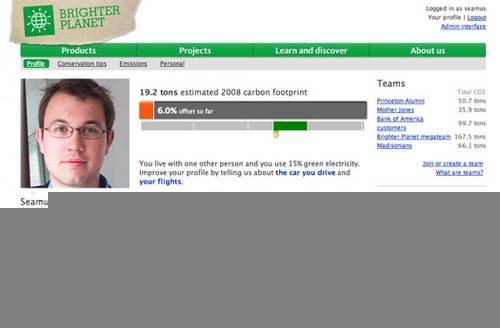Brighter Planet is a venture backed financial service that uses an innovative web interface to help you track and reduce your carbon footprint. Just like hybrid car owners obsess about the fluctuating MPG displays in their cars, Brighter Planet believes it will be compelling to show people visible progress online concerning their personal ecological impact.

As people add or change information about their activities, and as they make purchases using the Brighter Planet credit card, they can track their progress in reducing their personal carbon footprint. The company gathers data and leverages social connections in some interesting ways. It also aims to integrate itself with a wide variety of 3rd party services in the coming months.
For every $1000 you spend with the Brighter Planet credit card, the company purchases 1 ton of CO2 offsets. Through the end of 2008, Bank of America will match this by 50%. BrighterPlant is a for-profit corporation, but given the state of the environment I’m not going to quibble with anyone for starting a private company aiming to improve things.
The company was started as a project in an environmental economics course at Middlebury College in 2005 and launched in the US last month.
How Data is Collected

The most interesting part of the Brighter Planet service is its method of tracking your personal ecological impact. The website doesn’t ask users to fill out a lengthy questionnaire to gather information for processing through any of several available carbon footprint calculators. It also doesn’t track individual purchases and their respective impact.
Instead, the company starts with an average and works backwards. “We take the total US carbon inventory as determined by the EPA and divide that by the population,” co-founder and Director of R&D Andy Rossmeissl told me. “Inside of that average we’ve identified how it breaks down into average flying, average driving, etc. so when people decide to tell us about themselves, we’re refining our previous average assumptions by using real data.”
Users can provide as little or as much information about their activities as they like. Brighter Planet uses postal codes cross referenced with a local power system database to determine the percentage of a person’s power that’s likely produced through various means.
When you tell Brighter Planet what kind of car you drive the service imports data from the EPA’s fuel efficiency tables to determine that car’s carbon output. The site offers steps you can take to further reduce your impact. Incorporating monthly utility bills is next on the list of additions to the data set.
Next Comes the Social
Brighter Planet says the next step in implementing group functionality. While privacy is a concern when dealing with financial data, the company believes this is an obstacle it can overcome.
Watching your group, or multiple groups you belong to, work to decrease their collective carbon footprint could be another powerful means of motivation.
I would really like to see things like imported Attention Data be used to personalize carbon reduction tips. Working with personal data like this begs the question about how a company like Brighter Planet can leverage some data portability to improve its services.
I like what Brighter Planet is up to. I think their approach to data, motivation and aggregate personal change is very interesting.

















